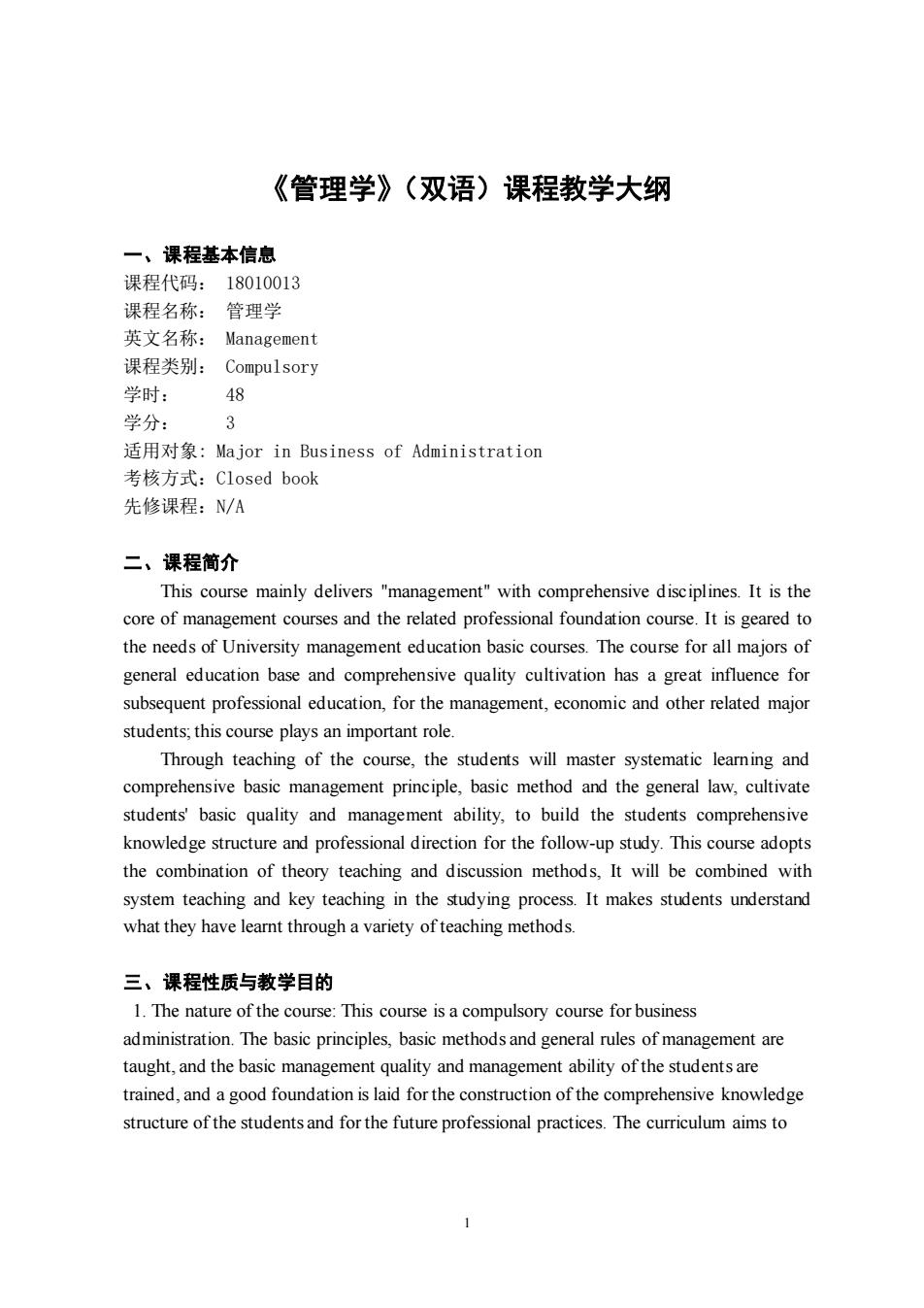
《管理学》(双语)课程教学大纲 一、课程基本信息 课程代码:18010013 课程名称:管理学 英文名称:Management 课程类别:Compulsory 学时: 48 学分: 3 适用对象:Major in Business of Administration 考核方式:C1 osed book 先修课程:N/A 二、课程简介 This course mainly delivers "management"with comprehensive disciplines.It is the core of management courses and the related professional foundation course.It is geared to the needs of University management education basic courses.The course for all majors of general education base and comprehensive quality cultivation has a great influence for subsequent professional education,for the management,economic and other related major students:this course plays an important role. Through teaching of the course,the students will master systematic leamning and comprehensive basic management principle,basic method and the general law,cultivate students basic quality and management ability,to build the students comprehensive knowledge structure and professional direction for the follow-up study.This course adopts the combination of theory teaching and discussion methods,It will be combined with system teaching and key teaching in the studying process.It makes students understand what they have leart through a variety of teaching methods. 三、课程性质与教学目的 1.The nature of the course:This course is a compulsory course for business administration.The basic principles,basic methods and general rules of management are taught,and the basic management quality and management ability of the students are trained,and a good foundation is laid for the construction of the comprehensive knowledge structure of the students and for the future professional practices.The curriculum aims to
1 《管理学》(双语)课程教学大纲 一、课程基本信息 课程代码: 18010013 课程名称: 管理学 英文名称: Management 课程类别: Compulsory 学时: 48 学分: 3 适用对象: Major in Business of Administration 考核方式:Closed book 先修课程:N/A 二、课程简介 This course mainly delivers "management" with comprehensive disciplines. It is the core of management courses and the related professional foundation course. It is geared to the needs of University management education basic courses. The course for all majors of general education base and comprehensive quality cultivation has a great influence for subsequent professional education, for the management, economic and other related major students; this course plays an important role. Through teaching of the course, the students will master systematic learning and comprehensive basic management principle, basic method and the general law, cultivate students' basic quality and management ability, to build the students comprehensive knowledge structure and professional direction for the follow-up study. This course adopts the combination of theory teaching and discussion methods, It will be combined with system teaching and key teaching in the studying process. It makes students understand what they have learnt through a variety of teaching methods. 三、课程性质与教学目的 1. The nature of the course: This course is a compulsory course for business administration. The basic principles, basic methods and general rules of management are taught, and the basic management quality and management ability of the students are trained, and a good foundation is laid for the construction of the comprehensive knowledge structure of the students and for the future professional practices. The curriculum aims to
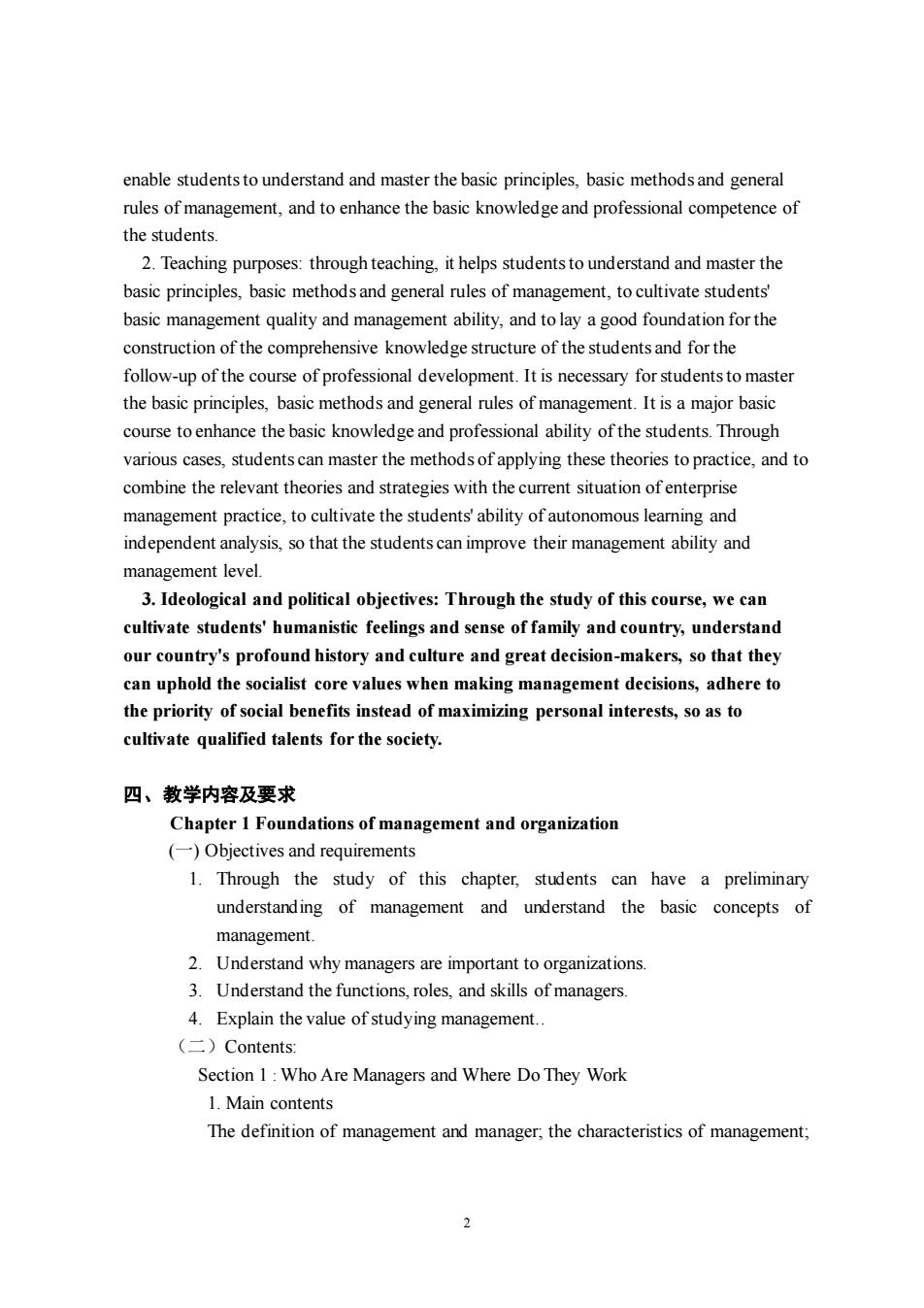
enable students to understand and master the basic principles,basic methods and general rules of management,and to enhance the basic knowledge and professional competence of the students. 2.Teaching purposes:through teaching.it helps studentsto understand and master the basic principles.basic methods and general rules of management.to cultivate students' basic management quality and management ability,and to lay a good foundation for the construction of the comprehensive knowledge structure of the students and for the follow-up of the course of professional development.It is necessary for students to master the basic principles,basic methods and general rules of management.It is a major basic course to enhance the basic knowledge and professional ability of the students.Through various cases,students can master the methods of applying these theories to practice,and to combine the relevant theories and strategies with the current situation of enterprise management practice,to cultivate the students'ability of autonomous learning and independent analysis,so that the students can improve their management ability and management level. 3.Ideological and political objectives:Through the study of this course,we can cultivate students'humanistic feelings and sense of family and country,understand our country's profound history and culture and great decision-makers,so that they can uphold the socialist core values when making management decisions,adhere to the priority of social benefits instead of maximizing personal interests,so as to cultivate qualified talents for the society. 四、教学内容及要求 Chapter 1 Foundations of management and organization ()Objectives and requirements 1.Through the study of this chapter,students can have a preliminary understarding of management and urderstand the basic conceptsof management. 2.Understand why managers are important to organizations. 3.Understand the functions,roles,and skills of managers. 4.Explain the value of studying management. (二)Contents Section 1:Who Are Managers and Where Do They Work 1.Main contents The definition of management and manager,the characteristics of management; 2
2 enable students to understand and master the basic principles, basic methods and general rules of management, and to enhance the basic knowledge and professional competence of the students. 2. Teaching purposes: through teaching, it helps students to understand and master the basic principles, basic methods and general rules of management, to cultivate students' basic management quality and management ability, and to lay a good foundation for the construction of the comprehensive knowledge structure of the students and for the follow-up of the course of professional development. It is necessary for students to master the basic principles, basic methods and general rules of management. It is a major basic course to enhance the basic knowledge and professional ability of the students. Through various cases, students can master the methods of applying these theories to practice, and to combine the relevant theories and strategies with the current situation of enterprise management practice, to cultivate the students' ability of autonomous learning and independent analysis, so that the students can improve their management ability and management level. 3. Ideological and political objectives: Through the study of this course, we can cultivate students' humanistic feelings and sense of family and country, understand our country's profound history and culture and great decision-makers, so that they can uphold the socialist core values when making management decisions, adhere to the priority of social benefits instead of maximizing personal interests, so as to cultivate qualified talents for the society. 四、教学内容及要求 Chapter 1 Foundations of management and organization (一) Objectives and requirements 1. Through the study of this chapter, students can have a preliminary understanding of management and understand the basic concepts of management. 2. Understand why managers are important to organizations. 3. Understand the functions, roles, and skills of managers. 4. Explain the value of studying management.. (二)Contents: Section 1 : Who Are Managers and Where Do They Work 1. Main contents The definition of management and manager; the characteristics of management;
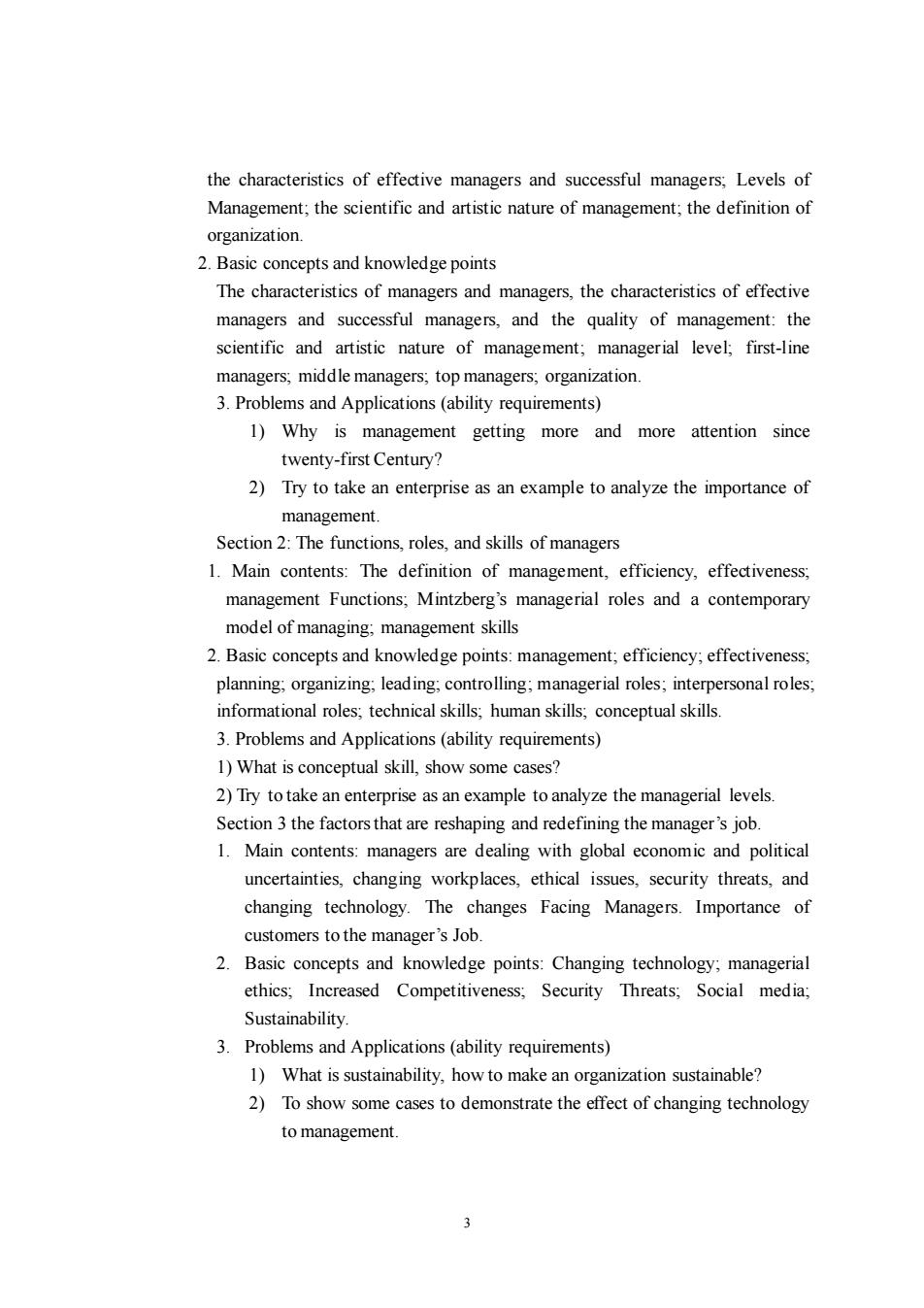
the characteristics of effective managers and successful managers,Levels of Management;the scientific and artistic nature of management;the definition of organization. 2.Basic concepts and knowledge points The characteristics of managers and managers,the characteristics of effective managers and successful managers,and the quality of management:the scientific and artistic nature of management:managerial level:first-line managers,middle managers;top managers;organization. 3.Problems and Applications(ability requirements) 1)Why is management getting more and more attention since twenty-first Century? 2)Try to take an enterprise as an example to analyze the importance of management. Section 2:The functions,roles,and skills of managers 1.Main contents:The definition of management,efficiency,effectiveness, management Functions;Mintzberg's managerial roles and a contemporary model of managing:management skills 2.Basic concepts and knowledge points:management,efficiency,effectiveness, planning,organizing:leading:controlling;managerial roles;interpersonal roles informational roles:technical skills;human skills;conceptual skills. 3.Problems and Applications(ability requirements) 1)What is conceptual skill,show some cases? 2)Try to take an enterprise as an example to analyze the managerial levels Section 3 the factors that are reshaping and redefining the manager's job. 1.Main contents:managers are dealing with global economic and political uncertainties,changing workplaces,ethical issues,security threats,and changing technology.The changes Facing Managers.Importance of customers to the manager's Job. 2.Basic concepts and knowledge points:Changing technology;managerial ethics,Increased Competitiveness;Security Threats;Social media; Sustainability. 3.Problems and Applications(ability requirements) 1)What is sustainability,how to make an organization sustainable? 2)To show some cases to demonstrate the effect of changing technology to management. 3
3 the characteristics of effective managers and successful managers; Levels of Management; the scientific and artistic nature of management; the definition of organization. 2. Basic concepts and knowledge points The characteristics of managers and managers, the characteristics of effective managers and successful managers, and the quality of management: the scientific and artistic nature of management; managerial level; first-line managers; middle managers; top managers; organization. 3. Problems and Applications (ability requirements) 1) Why is management getting more and more attention since twenty-first Century? 2) Try to take an enterprise as an example to analyze the importance of management. Section 2: The functions, roles, and skills of managers 1. Main contents: The definition of management, efficiency, effectiveness; management Functions; Mintzberg’s managerial roles and a contemporary model of managing; management skills 2. Basic concepts and knowledge points: management; efficiency; effectiveness; planning; organizing; leading; controlling; managerial roles; interpersonal roles; informational roles; technical skills; human skills; conceptual skills. 3. Problems and Applications (ability requirements) 1) What is conceptual skill, show some cases? 2) Try to take an enterprise as an example to analyze the managerial levels. Section 3 the factors that are reshaping and redefining the manager’s job. 1. Main contents: managers are dealing with global economic and political uncertainties, changing workplaces, ethical issues, security threats, and changing technology. The changes Facing Managers. Importance of customers to the manager’s Job. 2. Basic concepts and knowledge points: Changing technology; managerial ethics; Increased Competitiveness; Security Threats; Social media; Sustainability. 3. Problems and Applications (ability requirements) 1) What is sustainability, how to make an organization sustainable? 2) To show some cases to demonstrate the effect of changing technology to management
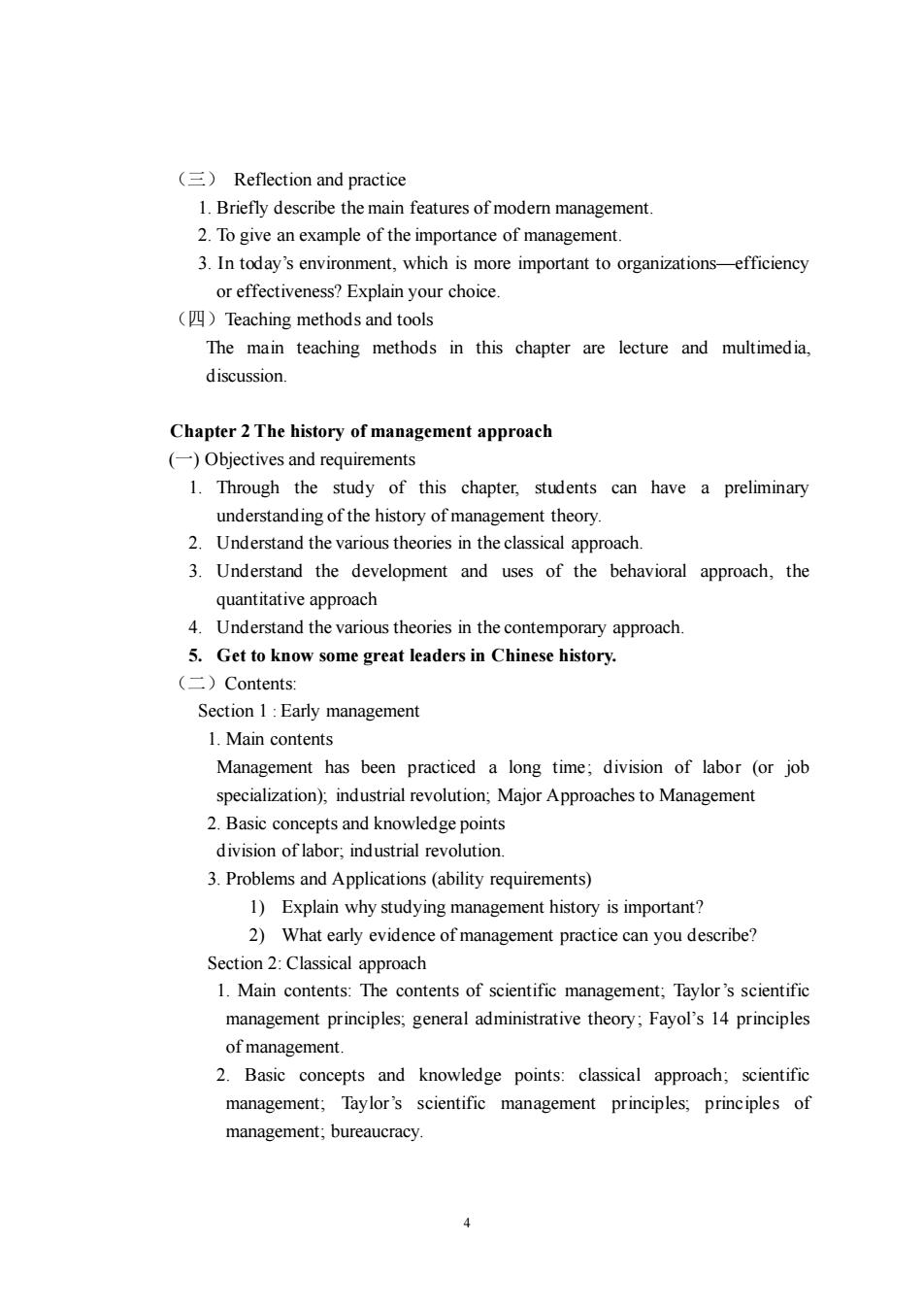
(Reflection and practice 1.Briefly describe the main features of modem management 2.To give an example of the importance of management. 3.In today's environment,which is more important to organizations-efficiency or effectiveness?Explain your choice. Teaching methods and tools The main teaching methods in this chapter are lecture and multimedia, discussion. Chapter 2 The history of management approach (-)Objectives and requirements 1.Through the study of this chapter,students can have a preliminary understanding of the history of management theory. 2.Understand the various theories in the classical approach. 3.Understand the development and uses of the behavioral approach,the quantitative approach 4.Understand the various theories in the contemporary approach 5.Get to know some great leaders in Chinese history. (二)Contents: Section 1:Early management 1.Main contents Management has been practiced a long time;division of labor (or job specialization),industrial revolution;Major Approaches to Management 2.Basic concepts and knowledge points division of labor:industrial revolution 3.Problems and Applications (ability requirements) 1)Explain why studying management history is important? 2)What early evidence of management practice can you describe? Section 2:Classical approach 1.Main contents:The contents of scientific management:Taylor's scientific management principles;general administrative theory:Fayol's 14 principles of management. 2.Basic concepts and knowledge points:classical approach;scientific management:Taylor's scientific management principles;principles of management;bureaucracy. 4
4 (三) Reflection and practice 1. Briefly describe the main features of modern management. 2. To give an example of the importance of management. 3. In today’s environment, which is more important to organizations—efficiency or effectiveness? Explain your choice. (四)Teaching methods and tools The main teaching methods in this chapter are lecture and multimedia, discussion. Chapter 2 The history of management approach (一) Objectives and requirements 1. Through the study of this chapter, students can have a preliminary understanding of the history of management theory. 2. Understand the various theories in the classical approach. 3. Understand the development and uses of the behavioral approach, the quantitative approach 4. Understand the various theories in the contemporary approach. 5. Get to know some great leaders in Chinese history. (二)Contents: Section 1 : Early management 1. Main contents Management has been practiced a long time; division of labor (or job specialization); industrial revolution; Major Approaches to Management 2. Basic concepts and knowledge points division of labor; industrial revolution. 3. Problems and Applications (ability requirements) 1) Explain why studying management history is important? 2) What early evidence of management practice can you describe? Section 2: Classical approach 1. Main contents: The contents of scientific management; Taylor’s scientific management principles; general administrative theory; Fayol’s 14 principles of management. 2. Basic concepts and knowledge points: classical approach; scientific management; Taylor’s scientific management principles; principles of management; bureaucracy
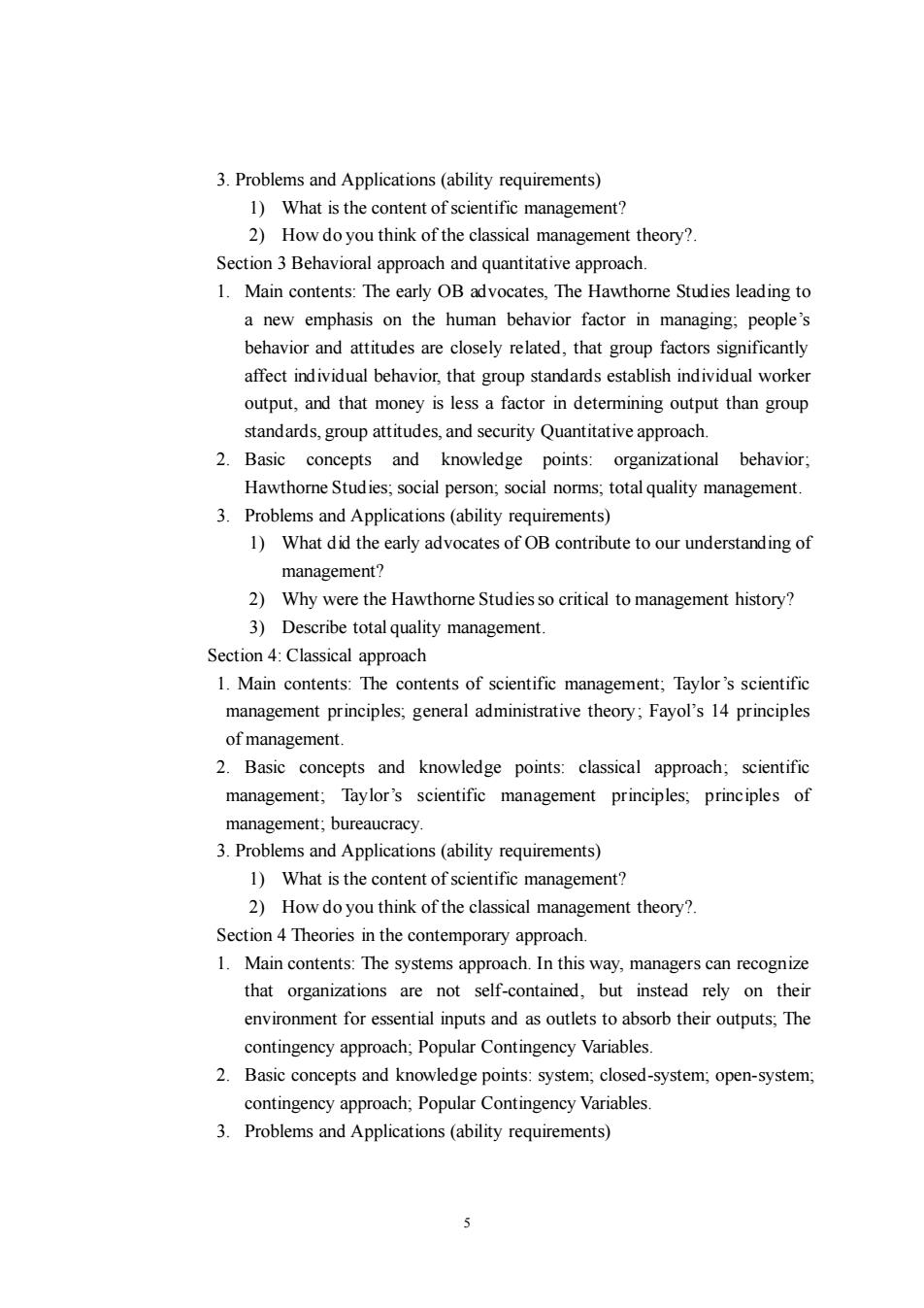
3.Problems and Applications(ability requirements) 1)What is the content of scientific management? 2)How do you think of the classical management theory? Section 3 Behavioral approach and quantitative approach 1.Main contents:The early OB advocates,The Hawthorne Studies leading to a new emphasis on the human behavior factor in managing;people's behavior and attitudes are closely related,that group factors significantly affect ind ividual behavior.that group standards establish individual worker output,and that money is less a factor in determining output than group standards,group attitudes,and security Quantitative approach. 2.Basic concepts and knowledge points: organizational behavior Hawthorne Studies;social person;social norms,total quality management. 3.Problems and Applications(ability requirements) 1)What did the early advocates of OB contribute to our understanding of management? 2)Why were the Hawthorne Studies so critical to management history? 3)Describe total quality management Section 4:Classical approach 1.Main contents:The contents of scientific management,Taylor's scientific management principles:general administrative theory:Favol's 14 principles of management. 2.Basic concepts and knowledge points:classical approach;scientific management;Taylor's scientific management principles;principles of management;bureaucracy. 3.Problems and Applications(ability requirements) 1)What is the content of scientific management? 2)How do you think of the classical management theory?. Section 4 Theories in the contemporary approach. 1.Main contents:The systems approach.In this way,managers can recognize that organizations are not self-contained,but instead rely on their environment for essential inputs and as outlets to absorb their outputs;The contingency approach;Popular Contingency Variables. 2.Basic concepts and knowledge points:system;closed-system,open-system, contingency approach;Popular Contingency Variables 3.Problems and Applications(ability requirements) 5
5 3. Problems and Applications (ability requirements) 1) What is the content of scientific management? 2) How do you think of the classical management theory?. Section 3 Behavioral approach and quantitative approach. 1. Main contents: The early OB advocates, The Hawthorne Studies leading to a new emphasis on the human behavior factor in managing; people’s behavior and attitudes are closely related, that group factors significantly affect individual behavior, that group standards establish individual worker output, and that money is less a factor in determining output than group standards, group attitudes, and security Quantitative approach. 2. Basic concepts and knowledge points: organizational behavior; Hawthorne Studies; social person; social norms; total quality management. 3. Problems and Applications (ability requirements) 1) What did the early advocates of OB contribute to our understanding of management? 2) Why were the Hawthorne Studies so critical to management history? 3) Describe total quality management. Section 4: Classical approach 1. Main contents: The contents of scientific management; Taylor’s scientific management principles; general administrative theory; Fayol’s 14 principles of management. 2. Basic concepts and knowledge points: classical approach; scientific management; Taylor’s scientific management principles; principles of management; bureaucracy. 3. Problems and Applications (ability requirements) 1) What is the content of scientific management? 2) How do you think of the classical management theory?. Section 4 Theories in the contemporary approach. 1. Main contents: The systems approach. In this way, managers can recognize that organizations are not self-contained, but instead rely on their environment for essential inputs and as outlets to absorb their outputs; The contingency approach; Popular Contingency Variables. 2. Basic concepts and knowledge points: system; closed-system; open-system; contingency approach; Popular Contingency Variables. 3. Problems and Applications (ability requirements)